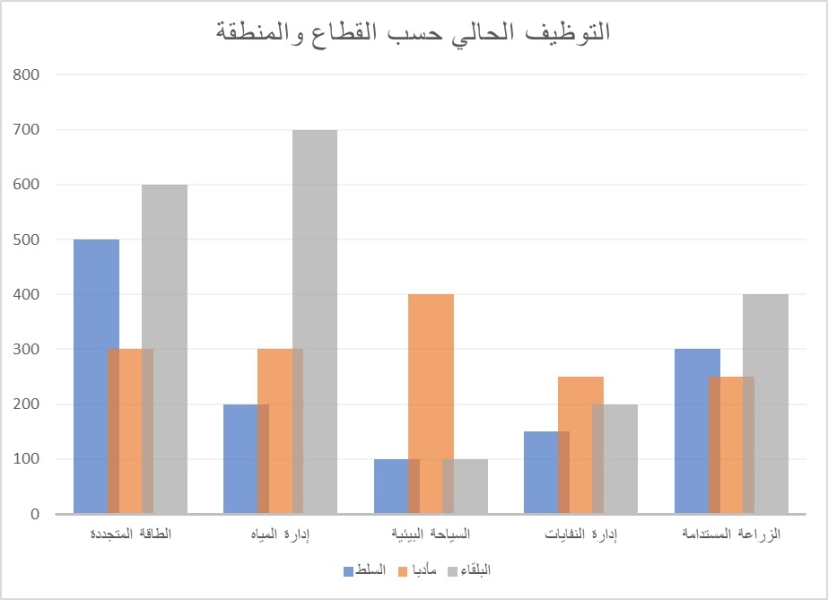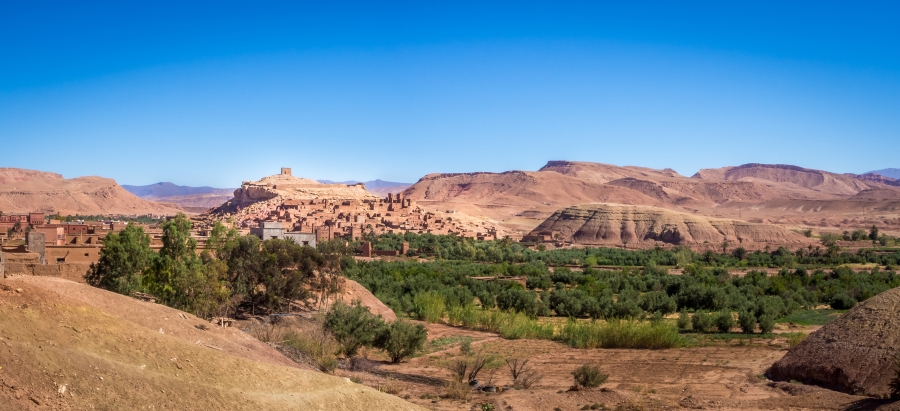Promoting sustainable employment through green job opportunities in Jordan...a comprehensive analysis of green employment strategies in Salt, Madaba, and Balqa

I. Introduction
In recent years, Jordan has faced growing environmental challenges exacerbated by its arid climate and scarce water resources. Amid these challenges, the pursuit of sustainable development through integrating green jobs has emerged as a crucial strategy—not only to stimulate economic growth but also to enhance climate resilience. Green jobs, defined by their ability to improve environmental quality, promise not just sustainable employment but also a pivotal role in essential adaptation strategies to mitigate the impacts of climate change. This paper explores the integration of green jobs into Jordan’s climate-resilience strategies, highlighting their potential to drive sustainable development in three specific regions: Salt, Madaba, and Balqa.
Context and Importance: Jordan’s economy, despite its diversity, faces significant challenges due to environmental constraints that threaten traditional sectors such as agriculture and tourism. The concept of green jobs extends beyond merely creating new employment opportunities. It encompasses a broader transformation of the labor market and the development of infrastructure to support sustainable practices. By aligning job creation with climate adaptation measures, Jordan can address its environmental vulnerabilities while enhancing economic resilience. This approach is particularly relevant in the context of Jordan’s National Green Growth Plan, which aims to align environmental sustainability with economic growth.
In regions such as Salt, Madaba, and Balqa, where agricultural practices and water scarcity shape daily life and economic activity, the potential for green jobs spans from sustainable agriculture and eco-tourism to innovative water management and renewable energy projects.
Objectives: This paper aims to analyze the potential of green jobs to enhance economic and environmental sustainability in Salt, Madaba, and Balqa. Each region provides unique opportunities and faces distinct challenges, making them ideal case studies to examine how tailored green job strategies can contribute to local and national goals.
- In Salt, the focus is on renewable energy solutions that can transform the energy landscape and reduce dependence on imported fuels.
- In Madaba, with its rich historical heritage and tourism appeal, eco-tourism initiatives have the potential to protect its cultural treasures while providing sustainable livelihoods.
- In Balqa, a vital agricultural hub, innovative water management practices offer opportunities to improve food security and manage water resources more effectively.
Through a detailed analysis of these regions, this paper explores how targeted green job strategies can mitigate specific environmental risks, contribute to economic resilience, and support Jordan’s broader sustainability goals.
II. Overview of Green Jobs in Jordan
Definition and Scope of Green Jobs
Green jobs have become a cornerstone of sustainable economic development, particularly in countries facing significant environmental challenges like Jordan. The International Labour Organization (ILO) defines green jobs as those that contribute to preserving or restoring environmental quality, either by increasing efficiency or reducing resource consumption. In Jordan, this definition is particularly significant in key sectors such as:
- Renewable Energy: Emerging as one of the most promising areas for green job creation, roles in this sector include designing and installing solar panels, operating and maintaining renewable energy infrastructure, and energy efficiency consulting.
- Sustainable Agriculture: With Jordan’s limited arable land and water resources, sustainable farming practices like organic farming, permaculture, and hydroponics are essential for food security and environmental sustainability.
- Water Management: Green jobs in water conservation, wastewater treatment, and rainwater harvesting are critical for addressing Jordan’s water scarcity.
- Eco-Tourism and Conservation: Jordan’s rich cultural and natural heritage, especially in regions like Madaba and Balqa, creates significant opportunities for eco-tourism and cultural preservation.
- Waste Management and Recycling: Effective waste management systems, including waste-to-energy initiatives and recycling programs, offer employment opportunities while addressing the environmental impacts of urbanization.
Current Employment Landscape
Jordan’s employment landscape is characterized by high unemployment rates, particularly among youth and women. The overall unemployment rate stands at 19%, with youth unemployment exceeding 40% in some regions. Traditional sectors like agriculture and tourism, which dominate rural areas, are increasingly vulnerable to climate change. Green jobs provide a dual solution: addressing unemployment while simultaneously supporting climate resilience and sustainability.
The table below highlights ongoing green initiatives and their employment impacts:
| Initiative | Sector | Region | Jobs Created | Job Types |
|---|---|---|---|---|
| Jordan Renewable Energy and Efficiency Fund (JREEEF) | Renewable Energy | Salt, Nationwide | 3,500+ | Installation, maintenance, design |
| Water Authority of Jordan (WAJ) | Water Management | Balqa, Madaba | 1,200+ | Irrigation, water conservation |
| RSCN Eco-Tourism Projects | Eco-Tourism | Madaba | 500+ | Tourism management, conservation |
| Amman Waste-to-Energy Initiative | Waste Management | Amman | 800+ | Recycling, energy conversion |
| Organic and Hydroponic Farming | Sustainable Agriculture | Salt, Balqa | 1,000+ | Farm management, organic farming |
III. Regional Opportunities for Green Jobs
Salt: Renewable Energy Projects and Their Employment Potential
- Salt’s high solar radiation levels and rural landscape make it ideal for solar and wind energy projects.
- Expansion of solar farms and wind turbines offers job opportunities in system design, installation, and ongoing maintenance.
Madaba: Eco-Tourism and Conservation Opportunities
- Madaba, renowned for its cultural heritage and natural reserves, is well-positioned to lead eco-tourism initiatives.
- Jobs include eco-guides, park rangers, conservation experts, and heritage site restoration specialists.
Balqa: Innovations in Water Management
- Given its acute water scarcity, Balqa is a hub for innovative water solutions like smart irrigation systems, wastewater recycling, and rainwater harvesting.
- Job opportunities exist in system installation, maintenance, and environmental engineering.
IV. Challenges and Enablers of Green Job Growth
Challenges:
- Economic barriers: High upfront costs for green technologies.
- Regulatory gaps: Inconsistent enforcement of environmental policies.
- Skills mismatch: A lack of training programs for specialized green roles.
Enablers:
- Government policies: National Green Growth Plan and targeted incentives for green industries.
- Private sector investment: Increased interest in renewable energy and eco-tourism.
- International support: Funding and expertise from organizations like the World Bank and UNDP.
V. Strategic Development for Sustainable Employment
Key Policy Recommendations
- Enhance Renewable Energy Policies: Provide tax incentives and subsidies for renewable energy projects, particularly in Salt.
- Promote Water Management Solutions: Offer grants for smart irrigation and rainwater harvesting technologies in Balqa.
- Invest in Eco-Tourism Infrastructure: Develop sustainable tourism facilities and training programs in Madaba.
- Strengthen Education and Training: Integrate green skills into educational curricula to address workforce gaps.
VI. Conclusion
Developing green jobs in Jordan represents not only a pathway to sustainable economic growth but also a solution to the country’s pressing environmental challenges. By fostering strategic investments in renewable energy, water management, and eco-tourism, Jordan can create thousands of new jobs while addressing unemployment and enhancing climate resilience.
With the right policies, investments in education, and public-private partnerships, Jordan has the potential to become a regional leader in the green economy. Expanding green jobs will drive economic development, environmental sustainability, and improved quality of life for Jordanians, positioning the country for a resilient and sustainable future.






